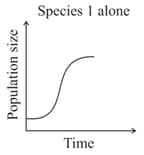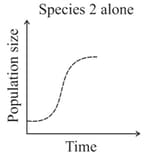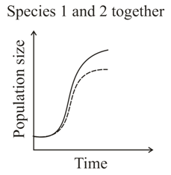MEDIUM
Earn 100
Match List I with List II:
List I
(Interacting species)
List II
(Name of Interaction)
A. A Leopard and a Lion in a forest/grassland
I. Competition
B. A Cuckoo laying egg in a Crow's nest
II. Brood parasitism
C. Fungi and root of a higher plant in Mycorrhizae
III. Mutualism
D. A cattle egret and a Cattle in a field
IV. Commensalism
Choose the correct answer from the options given below:
List I
(Interacting species)
List II
(Name of Interaction)
(a)A-II, B-III, C-I, D-IV
(b)A-I, B-II, C-III, D-IV
(c)A-I, B-II, C-IV, D-III
(d)A-III, B-IV, C-I, D-II
82.61% studentsanswered this correctly
Important Questions on Organisms and Populations
MEDIUM
Assertion (A): The Monarch butterfly feeds on poisonous weeds during its caterpillar stage.
Reason (R): It helps butterfly to become distasteful to the predator.
HARD
EASY
MEDIUM
Match column-I with column-II and select the correct option.
| Column-I | Column-II | ||
| a) | Commensalism | i) | Lichen |
| b) | Mutualism | ii) | Plasmodium |
| c) | Parasitism | iii) | Hawk |
| d) | Predation | iv) | Orchid |
MEDIUM

EASY
HARD
Given the graphs below, the interaction between species and can be classified as



EASY
Match the following?
| The list I | List II | ||
| (i) | Calotropis | (a) | Predator of Americana Pacific |
| (ii) | Cactus | (b) | Insects and frogs cryptically coloured |
| (iii) | Pisaster | (c) | Distasteful glycosides |
| (iv) | Monarch Butterfly | (d) | Cardiac glycosides |
| (v) | Camouflage | (e) | Predator is a moth |
HARD
| Column-I | Column-II | ||
|---|---|---|---|
| Saprophyte | Symbiotic association of fungi with plant roots | ||
| Parasite | Decomposition of dead organic materials | ||
| Lichens | Living on living plants | ||
| Mycorrhiza | Symbiotic association of algae and fungi |
Choose the correct answer from the options given below:
EASY
EASY
EASY
EASY
EASY
EASY
MEDIUM
Study the following table and pick up the correct combinations.
| S.No. | Interaction | Species A | Species B |
| I) | Mutualism | ||
| II) | Competition | ||
| III) | Predation | ||
| IV) | Parasitism | ||
| V) | Commensalism | ||
| VI) | Amensalism |
EASY
Match the following. The correct combinations are
| The list I | List II | List III | |||
| (a) | Fig tree | (i) | Highly distasteful | (p) | Petals of its flower |
| (b) | Ophrys | (ii) | Cryptically coloured | (q) | Special chemical present |
| (c) | Sea anemone | (iii) | Wasp | (r) | Clownfish |
| (d) | Camouflage | (iv) | Sexual deceit | (s) | Developing seeds |
| (e) | Monarch butterfly | (v) | Stinging cells | (t) | Insects and frogs |
HARD
1) The human liver fluke, a nematode parasite, depends on two intermediate hosts (a snail and a fish) to complete its life cycle.
2) The malarial parasite needs a vector (mosquito) to spread to other host organisms.
3) In case of brood parasitism, the eggs of parasitic birds (e.g., cuckoo) are not detected and removed from the nest because the parasite's eggs resemble the host's eggs in morphology and colour.
4) A population of frogs protected from all predators would decrease indefinitely.
HARD
EASY

